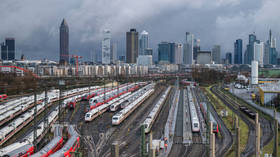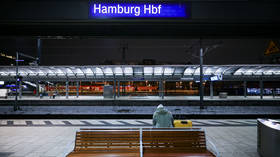Railway strike threatens German economy – Deutsche Bahn

German train workers have begun a six-day strike, set to be their longest ever, which analysts warn could end up costing the country’s economy as much as €1 billion ($1.09 billion).
The strike called by the country’s railway union, known as the GDL, began on Tuesday and will last through Monday. The action has brought most passenger and freight rail traffic to a standstill nationwide. Both long-distance and suburban train services are affected by the labor action.
The strike stems from an ongoing dispute between the GDL and rail operator Deutsche Bahn over pay and working hours. The union has been calling for a reduction of working hours from 38 to 35 per week and a wage increase of €555 per month, on top of a one-off payment of €3,000 to compensate for inflation. The walkout is the fourth carried out by the GDL since November.
While Deutsche Bahn made several concessions in its latest offer to the GDL, including pay rises of up to 13% and the chance to reduce the work week by one hour starting in 2026, the union said the proposals were insufficient.
Deutsche Bahn, meanwhile, slammed the new walkout. Company spokesperson Anja Broeker called the action “a strike against the German economy,” as cargo handled by the company includes supplies for power plants, refineries, and other industrial enterprises.
German Transport Minister Volker Wissing also criticized the strike, saying that talks between the union and Deutsche Bahn had become “increasingly destructive,” and that work stoppages merely exacerbate problems facing the supply chains that are already pressured by shipping disruptions in the Red Sea.
According to Deutsche Bahn, each strike day costs the German economy “a low two-digit million figure.” However, industry experts have warned that the actual losses could be much higher. Michael Groemling of Cologne’s Institute for Economic Research estimates the work stoppage could cost up to €100 million a day, a figure that could rise to as high as €1 billion in the worst-case scenario.
For more stories on economy & finance visit RT's business section













